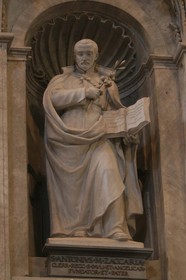
While he was at Milan he bethought him that greater Christian good might be done if he gathered round him some fellow-labourers in the Lord's vineyard, and when he had conferred thereon with those noble and holy men Bartholomew Ferrári and James Morigia, he founded the brotherhood of Clerks Regulars, to whom on account of his own great love for the Apostle of the Gentiles he gave the name of Clerks of St. Paul. Under the approbation of the Supreme Pontiff Clement VII and the confirmation of Paul III this brotherhood was in a short time widely spread abroad. The Congregation of nuns who are called Angelicals also regard Anthony Mary as their Father and Founder. His own thought of himself was so lowly that he never would be at the head of his own Order. In great long-suffering he bore with patience the violent storms which were raised against his Institute. In the greatness of his charity he never ceased to enkindle the members of religious orders to love toward God, to exhort priests to live Apostolic lives, and to found guilds of married men, to the bringing forth of much fruit. Somewhiles he and his disciples would walk through the streets and squares with a Cross carried before them, and there by burning and vehement harangues call to salvation the wandering and the wicked.
It is to be remembered that in his burning love for Jesus Crucified he reminded all men of the Mystery of the Cross by the sound of a bell every Friday evening, and himself as a true disciple of Paul always bore about in his body the dying of the Lord Jesus. The holy Name of Christ is found everywhere in his writings and was ever in his mouth. He was moved by a singular love toward the Holy Eucharist. He established a custom of receiving it often, and is said to have brought in the practice of exposing the same upon a lofty throne for three days' adoration. Of his earnest modesty the appearance of life which was seen even in his dead body seemed a witness. Together with all these things he possessed the gifts of trance, of tears, of knowledge of things to come, of reading the thoughts of the heart, and of power against the enemy of mankind. He was worn out with toil when he was seized with his last illness at Guastalla, whither he had been called as a peacemaker. He was carried to Cremona amid the tears of his brethren and the embrace of his devoted mother, whose imminent death he foretold. He was comforted by a vision of the Apostles above, and predicted the increase of his Brotherhood. On the 5th day of July, in the year 1539, he died a holy death at the age of thirty-six. Christians forthwith began to honour him for his eminent sanctity and the number of his signs and wonders, which honour the Supreme Pontiff Leo XIII approved and confirmed, and on the Feast of the Lord's Ascension in the year 1897 solemnly enrolled his name among those of the Saints.
For Books on Lives of the Saints




